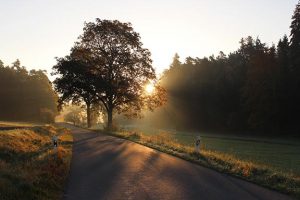 Samuel Barber begins his great oratorio, Knoxville: Summer of 1915 with James Agee’s suggestive words—“It has become that time of evening when people sit on their porches, rocking gently—talking gently, undulating in astral motion….” Front porches with rocking chairs or blankets on the grass on a summer night are less common for many of us these days. Even fewer people seem to have heard Barber’s oratorio or read James Agee. But I guess most who have grown up in the south at least have heard from the song from Porgy and Bess:
Samuel Barber begins his great oratorio, Knoxville: Summer of 1915 with James Agee’s suggestive words—“It has become that time of evening when people sit on their porches, rocking gently—talking gently, undulating in astral motion….” Front porches with rocking chairs or blankets on the grass on a summer night are less common for many of us these days. Even fewer people seem to have heard Barber’s oratorio or read James Agee. But I guess most who have grown up in the south at least have heard from the song from Porgy and Bess:
“Summer time and the livin’ is easy. Fish are jumpin’ and the cotton is high. Your Daddy’s rich and your Momma’s good lookin’ so hush little baby, don’t you cry.”
What made me think of these memorable songs of summer is not the cultural calendar that marks the first day of summer as June 21st or the Memorial Day weekend, which for many opens the season. Frankly, it was the Church’s calendar, which marked the Wednesday, Friday, and Saturday after Pentecost as Ember Days. Ember Days are vestiges of the early centuries in the Church’s life as it evangelized an agrarian society. Some years ago I wrote on my blog of “Life’s Fallow Seasons”. It is the natural theme for the Winter Ember Days, which follow St. Lucy’s Day, December 13. There are also Spring and Fall Ember Days—for the seasons of seedtime and harvest—the sowing and reaping seasons of life.
The spring reminds us that there are seasons of life when we live for the future; that not every hour, day, or season of life is for now; when we realize the present needs to be the doorway for tomorrow. We realize during such seasons that today’s decisions, sacrifices, and duties will pay dividends in the future. A constant theme of teachers of the young or of financial advisors like Dave Ramsay. This is irrefutable wisdom and has far less to do with age then we sometimes realize. The American poet, Archibald McLeish once observed, “At eighty, you have to begin to look ahead.” Preparing for the future is as much for the elderly as for the young. An older couple arranging for their funerals or making out a will, less blinded perhaps from the illusions of the busy middle years of life, are in that moment living and planning for a tomorrow that is sure to come. Yet there can be danger in always looking ahead. We can be stuck in a perpetual mode of preparation. Always preparing for some tomorrow and never getting around to living for today.
 Summer Ember days remind us that there are days—even seasons—where life’s living is for now. While we know fall and winter will come—and we need to be prepared for such seasons—today isn’t always a day to prepare for them. Today is first and foremost a day to live. Today matters. It can be working, fishing, sitting and enjoying life—but it is for now. In today’s world we need to hear that somedays, some seasons are for living—not the reaping of the past—not sowing for the future but living for today. The man who takes a vacation so he can do his work better or the person who has a picnic on the 4th of July so he can work harder (or more efficiently) on July 5th has not yet understood what a picnic or holiday is. I have known some clergy over the years who did not take their vacation days. Frankly, sometimes they were not always the most effective priests. Not because they did not rest—but because they did not drink deeply enough of life.
Summer Ember days remind us that there are days—even seasons—where life’s living is for now. While we know fall and winter will come—and we need to be prepared for such seasons—today isn’t always a day to prepare for them. Today is first and foremost a day to live. Today matters. It can be working, fishing, sitting and enjoying life—but it is for now. In today’s world we need to hear that somedays, some seasons are for living—not the reaping of the past—not sowing for the future but living for today. The man who takes a vacation so he can do his work better or the person who has a picnic on the 4th of July so he can work harder (or more efficiently) on July 5th has not yet understood what a picnic or holiday is. I have known some clergy over the years who did not take their vacation days. Frankly, sometimes they were not always the most effective priests. Not because they did not rest—but because they did not drink deeply enough of life.
Summer Ember Days and Sabbath bring a similar message to us. Philo, a Greek speaking Jew in first century Alexandria wrote in a defense of the Sabbath to his Greco-Roman peers: “It’s object is rather to give man relaxation from continuous and unending toil and by refreshing their bodies with a regularly calculated system of remissions to send them out renewed to their old activities….” This, however, as true as it is on one level is actually not the spirit of the Bible. In this defense of the Sabbath, “rest’ takes on a utilitarian purpose. Nevertheless, the Bible’s view of the Sabbath is not something we observe to enhance the efficiency of work—as if we are first and finally beasts of burden. As Jesus said, “The Sabbath is made for man not man for the Sabbath.” The great Jewish scholar, Abraham Heschel notes: “The Sabbath is a day for the sake of life…not for the purpose of enhancing the efficiency of [man’s] work. The Sabbath is not for the sake of the weekdays; the weekdays are for the sake of the Sabbath.” The Summer Ember days along with the Sabbath remind us that today is a day to live. Life is now and now is for living.
 Jesus took one look at his disciples freshly returned from their missionary adventures and said, “Come away by yourselves to a lonely place and rest awhile.” (Mark 6: 30-32) It was rest with the beauty of God’s creation; it was rest with those with whom they shared much of their lives; it was a rest away from the disorienting world; and it was a rest with Christ. It was a much-needed season for rest and for Sabbath. The traditional translation of our Lord’s teaching in Matthew 11:28-30 is so well known and we pass over it too quickly. Perhaps, Eugene Peterson’s rendering may help us hear afresh: “Are you tired? Worn out? Burned out on religion? Come to me. Get away with me and you’ll recover your life. I will show you how to take a real rest. Walk with me and work with me—watch how I do it. Learn the unforced rhythms of grace. I won’t lay anything heavy or ill-fitting on you. Keep company with me and you’ll learn to live freely and lightly.”
Jesus took one look at his disciples freshly returned from their missionary adventures and said, “Come away by yourselves to a lonely place and rest awhile.” (Mark 6: 30-32) It was rest with the beauty of God’s creation; it was rest with those with whom they shared much of their lives; it was a rest away from the disorienting world; and it was a rest with Christ. It was a much-needed season for rest and for Sabbath. The traditional translation of our Lord’s teaching in Matthew 11:28-30 is so well known and we pass over it too quickly. Perhaps, Eugene Peterson’s rendering may help us hear afresh: “Are you tired? Worn out? Burned out on religion? Come to me. Get away with me and you’ll recover your life. I will show you how to take a real rest. Walk with me and work with me—watch how I do it. Learn the unforced rhythms of grace. I won’t lay anything heavy or ill-fitting on you. Keep company with me and you’ll learn to live freely and lightly.”
Yes, the fallow season has its rest—the earth rests that we may rest—but it is a passive rest that waits and prepares for springtime and for sowing. The rest of summer is an active rest—that is it does not anticipate so much as it delights, enjoys, and is. Oddly enough, it often ends up shaping life more that we realize. This is not because it plans to; but almost because it doesn’t. Take it from one who has heard more eulogies than the average person. When grandchildren, nephews and nieces get up at a funeral or wake to share memories of the departed relative more often than not the memories they share and that shaped them are moments and experiences of some vacation, or weekend with their grandparents, great uncle or aunt. It wasn’t a time set aside or planned to be formative of the future or reflective of yesterday. It was intended only to be a time for now; for today; for the evening; a time of “rocking gently—and talking gently, undulating in astral motion….” and in the process it seems the moving stars inexorably shaped a future, a life, a child, anointing another with delight. Summertime—when the living is for now…when today and eternity matters!


Thank you so much, Mark. May the Lord bless & keep you & Allison always. Y’all are often in my thoughts & prayers. Love to my friends, Margaret (Howard) Barrow
[If I may, and since the previous replies have not been moderated, I submit this final improved reply. Thank you. August 6, 2018]
“The rest of summer is an active rest—that is it does not anticipate so much as it delights, enjoys, and is. Oddly enough, it often ends up shaping life more that we realize. This is not because it plans to; but almost because it doesn’t.”
God’s greatest gifts seem to be things we did not plan. Summer is growing season, and the “natural” bounty of the earth, though it can be harnessed by man, is nevertheless a gift that we did not plan or create. This reminds me of the agricultural parables of Jesus, in Matthew 13 and other places. “The kingdom of heaven is like a grain of mustard seed…” It starts small and takes time to grow. We should not get impatient. In Mark 4, Jesus says, “The kingdom of God is as if a man should scatter seed on the ground. He sleeps and rises night and day, and the seed sprouts and grows; he knows not how. The earth produces by itself, first the blade, then the ear, then the full grain in the ear.”
That thought leads me to another; namely, that we should be patient with our friends and family in The Episcopal Church, even as we strive with them in court and in theology. People, both ourselves and those we contend with, change and grow, and that growth process is usually hidden from us. I have seen signs that seeds of renewal have sprouted and are growing in TEC, as well as among us Anglicans. Liberal Christians may be already ahead of us in concern for justice to the poor. As the seeds of faith grow, people change and mature, as they manifest different aspects of God’s life. While we contend, as we should, for the ancient doctrines of our faith, we can also relax and encourage our TEC friends in their service to the Lord, and we can enjoy working with them in the Daughters of the King, Kairos, and in other places.
Sam Dargan
[Improved comment on the bishop’s blog post, August 4, 2018]
“The rest of summer is an active rest—that is it does not anticipate so much as it delights, enjoys, and is. Oddly enough, it often ends up shaping life more that we realize. This is not because it plans to; but almost because it doesn’t.”
God’s greatest gifts seem to be things we did not plan. Summer is growing season, and the “natural” bounty of the earth, though it can be harnessed by man, is nevertheless a gift that we did not plan or create. This reminds me of the agricultural parables of Jesus, in Matthew 13 and other places. “The kingdom of heaven is like a grain of mustard seed…” It starts small and takes time to grow. We should not get impatient.
That thought leads me to another; namely, that we should be patient with our friends and family in The Episcopal Church, even as we strive with them in court and in theology. In Mark 4, Jesus says, “The kingdom of God is as if a man should scatter seed on the ground. He sleeps and rises night and day, and the seed sprouts and grows; he knows not how. The earth produces by itself, first the blade, then the ear, then the full grain in the ear.”
People, both ourselves and those we contend with, change and grow, and that growth process is usually hidden from us. I have seen signs that seeds of renewal have sprouted and are growing in TEC, as well as among us Anglicans. Liberal Christians may be already ahead of us in terms of justice to the poor. As the seeds of faith grow, the plants that we see change and mature, as they manifest different aspects of God’s life. While we contend for the ancient doctrines of our faith, we can also relax and encourage our TEC friends in their service to the Lord, and we can enjoy working with them in the Daughters of the King, Kairos, and in other places.
Sam Dargan
“The rest of summer is an active rest—that is it does not anticipate so much as it delights, enjoys, and is. Oddly enough, it often ends up shaping life more that we realize. This is not because it plans to; but almost because it doesn’t.”
The principle of the Sabbath is “active rest.” Even as we work towards an uncertain future, we can have inner peace that God’s care surrounds us and that his providence will make “all things work together for good to those who are called according to his purpose.” (Romans 8:28)
This has application to our attitude towards members of The Episcopal Church (TEC). Most of us have friends and family in TEC, and we tend to carry into those relationships the tension of the ongoing theological and legal battles. We can put down that burden, in this summer of waiting, and simply share the love of God with our friends on the other side. We are not compromising with error when we show kindness to those we think are in error. Rather, we are balancing two different aspects of God’s truth. While it is true that we should stand for the authority of scripture and the historic doctrines of the faith, it is also true that we should show patience, kindness and love towards those whom we think are our enemies. See Matthew 5:43-48 and 1 Timothy 6:11. We can relax and encourage our TEC friends in their service to the Lord, and we can enjoy working with them in the Daughters of the King and in Kairos.
Members of TEC may not actually be our enemies. Summer is growing season, and this reminds me of the agricultural parables of Jesus, in Matthew 13 and other places. “The kingdom of heaven is like a grain of mustard seed…” It starts small and takes time to grow. Beware of impatience. People, both ourselves and those we contend with, change and grow. That growth process is usually hidden from us. In Mark 4, Jesus says, “The kingdom of God is as if a man should scatter seed on the ground. He sleeps and rises night and day, and the seed sprouts and grows; he knows not how. The earth produces by itself, first the blade, then the ear, then the full grain in the ear.” The seeds of renewal have sprouted and are growing in TEC, as well as among us Anglicans. As the seeds of faith grow, the plants we see change and mature, manifesting different aspects of God’s life. We can work for truth joyfully in our troubled times, knowing that change always brings new expressions of the ancient words of our Lord.
Pingback: Bp Mark Lawrence: Summer—When Living is for Now | TitusOneNine